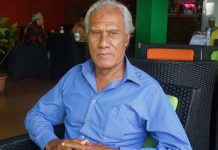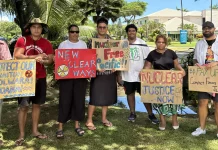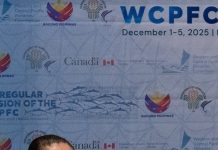Op-ed by Maureen Penjueli
Fiji’s noble banner blue has always flown high at the international level. We have enjoyed the status of a country with a population of less than a million, and as a smaller island developing state, we have punched well above our weight internationally. From the Chair of the G77, President of the United Nations (UN) General Assembly, hosting of the climate COP, founding member of UN Law of the Sea and the first President of the UN Ocean Conference, to mention a few, Fiji has used its diplomatic presence to advocate for small Island states and their collective rights.
In less than two years, the Rabuka led coalition government has been slowly eroding our international reputation. Fiji’s diplomatic stance on the Gaza war; its vague standing on nuclear concerns; and Rabuka’s close association with France questions his conflict of interest as a peacemaker for Kanaky New Caledonia.
The latest saga unfolded on the 17th of October 2024 in the vote for the UN resolution titled “Implementation of the Declaration on the Granting of Independence to Colonial Countries and Peoples: eradicating colonialism in all its forms and manifestations”. It was approved by 99 countries, 61 abstentions and 1 vote against. That 1 vote against was Fiji. This vote sheds light on Fiji’s voting pattern since this government came into power.
In the aftermath of this shameful vote and under public scrutiny, the Rabuka Government went into damage control mode and attempted to justify its position in a poorly drafted press statement and subsequent media interviews. Arguing on the grounds of procedural matters – that the resolution was not widely consulted and in Rabuka’s own words ‘ambushed’, and that the draft amendment to the original resolution, which Fiji is an original sponsor of, goes beyond the mandate of the UN Special Committee on Decolonisation (C-24). The Government fails to explain how the amended resolution goes beyond the mandate of the C-24.
The draft amendment changed some of the original text replacing the phrase “all others that may be or may have been affected by colonialism in all its forms and manifestation” with “other territories that have not attained independence in accordance with UN General Resolutions on decolonisation”.
The amended resolution language implies that the UN General Assembly should ‘condemn in the strongest terms the crimes committed during the colonial era, and call upon donor countries and multilateral organisations to give the utmost consideration to the needs of Non-Self Governing Territories and other territories that have not yet gained independence’. The representative from Venezuela who spoke on behalf of Friends in Defence of Charter of United Nations, argued that the amendment is about “recognition of the need to provide redress “for the continued impact of enduring colonialism through restorative justice and where appropriate reparations”. This is in essence what Fiji voted against – recognition, redress, justice and reparation.
What’s more shameful, is that the Rabuka Government further attempted to sully the waters by implying that Fiji’s position was in line with the Melanesian Spearhead Group (MSG) and the Pacific Islands Forum mandates. The region has a long and proud history of supporting the liberation of our people against the scourge of colonisation! The Pacific remains one of the regions in the world with the highest number of remaining territories under the United States of America (USA), France, Chile, and Indonesian colonial rule.
Fiji’s vote against this resolution makes a clear-cut case of the company that the Rabuka Government stands with and what they stand for. The USA, Australia, New Zealand, Germany, Canada, France and the United Kingdom (UK) who all have histories as colonisers or are still a coloniser, all raised serious objections and concerns on procedural matters, the US delegate going as far to suggest that it was ‘rammed through’ and language to the amendments to the resolution, none however voted against it! Just Fiji in this case – Fiji could have chosen to raise its strong objections on the floor and abstain on the vote. The USA unsurprisingly, voted against all the other resolutions, while the UK consistently abstained!
This vote is the latest in a number of votes from Fiji that have demonstrated a sharp turn towards positions that support the actions of colonising powers.
Since the Rabuka led coalition government came into power it has voted consistently with Israel, a genocidal coloniser in the unlawful occupation of Palestine. Shameful! At the regional level, it explains why Fiji, who is part of the Indo-Pacific alliance and supportive of AUKUS, will stand with the United States in the case of Guam and other territories. The United States delegate blatantly asserted their right to carry out military activities in accordance with its own security interests and expressed strong disagreement with its own Federal Court ruling in the text of the question on Guam. While the Australian delegation expressed strong objections to operative language calling on administering Powers to terminate military activities and eliminate military bases in Non-Self Governing Territories. This comes as campaigners on behalf of indigenous communities in Guam launched a fresh human rights complaint against the US military!
The vote against, explains why the Rabuka government will stand with France in the case of New Caledonia! Rabuka’s long dance with Paris since 1987 is well documented, raising serious questions on why Fiji is insisting to be part of the Troika mission to New Caledonia. Rabuka, raised alarm bells with his assertion of recognising France’s sovereignty first and foremost rather than respecting the principle of the ‘irreversibility’ of the Noumea Accord. According to UN Experts, Agreements made under the Accord must be constitutionally guaranteed until New Caledonia achieves full sovereignty in accordance with France’s commitment. Rabuka, cannot be expected to be neutral in the future of New Caledonia since his position is already clear. It also explains why Fiji sought to be the special envoy on West Papua, but will stand with Indonesia in exchange for further economic and military ties!
But Fiji can still come back from the brink of being a pariah state and fly the noble banner blue again – the PM should answer to Parliament. In an interview with local media, the PM makes clear that Fiji did not make a mistake and in fact knowingly pressed the red button! If indeed the vote against, is Fiji’s foreign policy on the issue of decolonisation, then Fiji should rescind the following positions – membership on the C-24, member of the Troika mission to New Caledonia, the Special envoy for West Papua, and to withdraw the Ocean of Peace concept, effective immediately to bring hope for those who continue to endure oppression under colonial rule. Rabuka’s recent comments to the media on the Troika mission and in particular his views on France should be viewed as potentially inflammatory and risk an already fragile situation.
Fiji has suffered and experienced the impacts of colonial rule and exploitation, this history should not be swept aside on account of a desire to be close to power. Fiji has long championed and stood up for itself and other countries, often smaller than it. By siding with the colonisers it is undoing all the good work it has done.
Maureen Penjueli is the co-coordinator of the Pacific Network on Globalisation (PANG).


















